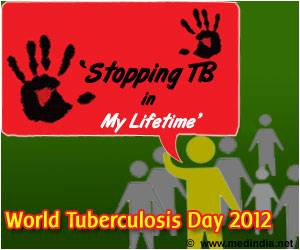
The choice, said Kenneth Castro, of the US Centers for Disease Control and Prevention, at the same press conference, is to "pay now, or pay more later."
The WHO has pledged to cut TB deaths to half the 1990 rate, a goal the agency said in its new report it was on track to achieve in most regions. The number of new cases per capita had also fallen -- down 2.2 percent in 2011 from the year before.
Nevertheless, tuberculosis remains one of the world's top killers: in 2011, there were some 8.7 million new cases around the world, causing 1.4 million deaths, according to the new report.
And the epidemic of multi-drug-resistant tuberculosis remains a monumental challenge, Raviglione said.
In 2012, only about one in five of those estimated to have the TB strains resistant to standard medications were officially diagnosed as such, the report revealed. In China and India, that figure was even worse: fewer than one in 10 drug resistant cases were detected.
Advertisement
"One of the major reasons for the development of multiple-drug-resistant TB is inadequate treatment of plain old garden variety TB," Fauci told reporters.
Advertisement
But hope for wresting better control of the drug-resistant strains is rising thanks to a relatively new and inexpensive tool that allows for rapid diagnosis in a lab, in under two hours.
Some 67 developing countries, led by South Africa, are rolling out the molecular test, whose price has dropped by nearly half to $10 in the space of just a few months.
Equally exciting are two new drugs, on a path to be approved by the US and Europe for use in patients by next year.
The drugs -- the first new TB medications in over forty years -- were developed using high-tech analyses of the bacillus that causes tuberculosis, making them the first ever designed specifically for the treatment of the lung disease, he explained.
And as many as a dozen new vaccine candidates are in development to replace the imperfect one currently used.
Medical aid group Medicins Sans Frontiers agreed the new tools are promising, but said more must be done.
The WHO report "reinforces that multidrug-resistant tuberculosis is an escalating public health emergency," the group's TB advisor Grania Brigden said in a statement.
"Yet the global response is abysmal, with levels of testing and treatment remaining shockingly low," she said, adding that, even when diagnosed, the survival rate of multi-drug-resistant TB is less than 50 percent.
"We continue to struggle every day with inadequate tools and drugs to tackle the disease," which is increasing in prevalence in the places they work, she said.
Medical journal "The Lancet" was similarly frustrated, arguing in an editorial published to coincide with the WHO report that "insufficient attention and funding over several decades have allowed the global epidemic to remain a deep scar on the reputation of global health."
The WHO said it is $3 billion short of the $8 billion it needs to implement its plans to treat and control TB next year. And it has only a third of the $2 billion needed required for research and development.
"If the gaps are not filled ... we are going to see and we have to accept millions of deaths," from tuberculosis in the coming years, Raviglione warned.
"We will not have a decline in incidence. We will not be able to say elimination is possible in some settings, because the incidence will stabilize and probably grow again."
Source-AFP











